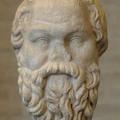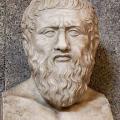17 - Raphael Woolf on Socrates
Posted on
Peter's colleague Raphael Woolf joins him to discuss Socrates as he is portrayed by Plato: the gadfly of Athens. But was he an ascetic? And could it really be true that virtue is knowledge?
Themes:
Further Reading
R. Woolf, ‘Socratic Authority’, Archiv für Geschichte der Philosophie 90 (2008), 1-38; reprinted in P. Remes and J. Sihvola (eds.), Ancient Philosophy of the Self, Springer (2008), 77-107.
R. Woolf, ‘The Practice of a Philosopher’, Oxford Studies in Ancient Philosophy 26 (2004), 97-129 [about Socrates in Plato's Phaedo].







Comments
Sympathy for people who don't know what they are talking about?
I don't have sympathy for any of Plato's interlocutors when engaged in discussion with Socrates.
Is there something wrong with me?
Anyone who gets annoyed with another who shows them they don't know what they are talking about might be mentally immature and/or psychologically/emotionally insecure.
In reply to Sympathy for people who don't know what they are talking about? by TD
Sympathy
Well, I think Raphael Woolf is right to say at least that many students find Socrates more annoying than the interlocutors. It is perhaps not so much a question of whether the interlocutors know what they are talking about, as whether Socrates is arguing fairly, or holding them to unreasonable standards (like, do I really need to be able to define courage to prove I am courageous?). Anyway as a historical matter I think we can safely say the other Athenians found him provocative to say the least!
Socrates and Pleasure
I'm sorry I didn't really get what you said about Socrates's view of pleasure. Did he mean everything good is pleasure and vice versa?
In reply to Socrates and Pleasure by Background
Socrates and pleasure
Well, this differs depending on dialogue. There is an exceptional case which is the Protagoras where Socrates seems to assume an equivalence between the good and pleasure, so the classic hedonist position. Maybe only for the sake of argument. Then in other dialogues like the Gorgias he is shown as very critical of hedonism.
Knowledge is Virtue? Really?
This emphasis on the necessity of knowledge really doesn't jive with what we see represented as a good society in the republic, where the way to preserve virtue is to propogandize an entire class of people, lie to them about their relationships to one another and to the state etc. Would you say that the Socrates of the Republic is more of a Platonic Socrates than a Socratic one or what? It seems like Plato sees knowledge of virtue to be something that is very important for Philosophers and Philosopher kings, but he thinks ordinary people can live useful and happy lives in ignorance. Socrates is presented as trying to improve the people around him but he also envisions a society where some people never improve (in their knowledge) beyond certain points. I haven't gotten to the episode on the republic so I don't know it this is something that has been addressed already.
In reply to Knowledge is Virtue? Really? by Cian
Socrates vs Socrates
Your basic idea there is one that most scholars would accept, namely that the Socrates of the earlier dialogues accepts some things (e.g. virtue = knowledge) that Plato may have gone on to reject. I agree that the Republic does seem to put that thesis in question, though not necessarily for the reason you mention - because the happy non-philosophers in the city may not be virtuous, only happy. However virtue in the Republic seems to involve subduing the two lower aspects of the soul to reason, which is really a very different conception than anything we find in the so called "Socratic" dialogues.
Add new comment